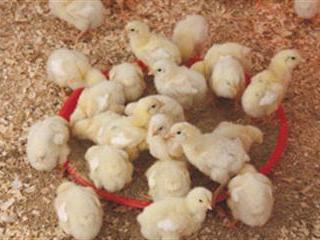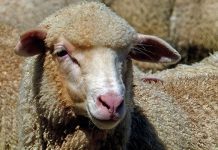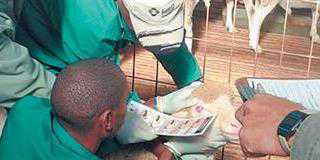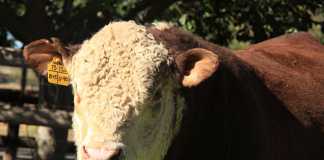
An experienced broiler house manager learns to use the sounds made by the chickens to check that they’re healthy and comfortable. According to poultry expert Bruce Gibson, discomfort is indicated if broilers of any age make high-pitched, distressed calls. Discomfort could be due to a number of factors, including incorrect temperature or poor ventilation inside the broiler house, or a lack of feed and/or water.
As soon as you hear this particular call, you must immediately identify and remedy possible causes of the broilers’ distress, suggests Bruce. Reputable suppliers of day-old broiler chicks routinely vaccinate chicks against avian infectious bronchitis and infectious bursal disease virus before despatching them to clients. This vaccination is typically applied as a vapour which the chicks inhale. It can also be administered as an eye drop, a process wherein the chicks also end up swallowing part of the vaccine, explains Bruce.
About five days after receiving this vaccination – and when they’ve already spent some days in the broiler house – the chicks should start showing a reaction to the vaccine. Ideally this reaction should be a slight snick, almost like a tiny sneeze, that’s heard at chick level on the floor of the broiler house.
“However, if the chicks, or even older broilers, develop a heavy snick, immediately consult a private or state vet, who will visit the broiler house, do a post-mortem examination on one or more broilers and recommend a treatment and any other course of action necessary to solve the problem,” says Bruce. It’s important to remember that broilers can develop a snick not only in reaction to a vaccination, but due to a variety of other factors, including excessive ammonia build-up in the house, and other problems with broiler house ventilation, he cautions.
Always consult an animal health expert for advice if you have any concerns about the health of your broilers.
Contagious diseases
Avian infectious bronchitis virus (IBV)
IBV is caused by a coronovirus which affects the respiratory tract and the urogenital tract. It is highly contagious in poultry and initially causes respiratory disease characterised by gasping, coughing and nasal discharge in infected birds. The incidence of infection is high in unvaccinated flocks and mortality depends on management and involvement of secondary bacterial infections. IBV can be prevented by vaccination and good biosecurity.
Infectious bursal disease VIRUS (IBDV)
A highly contagious, persistent virus shed in faeces. In the sub-clinical form presenting in chicks up to three weeks old, it causes permanent and severe immunosuppression. The clinical phase from three to six weeks shows dehydration, trembling, ruffled feathers, depression and watery diarrhoea. Control can be achieved by vaccination and revaccination at the appropriate times, and good biosecurity.
Bruce Gibson of Pietermaritzburg in KwaZulu-Natal, spent 36 years in broiler production for poultry company Rainbow Chickens. He continues to stay abreast of broiler production developments. Contact Bruce on 033 386 6152, or [email protected].













